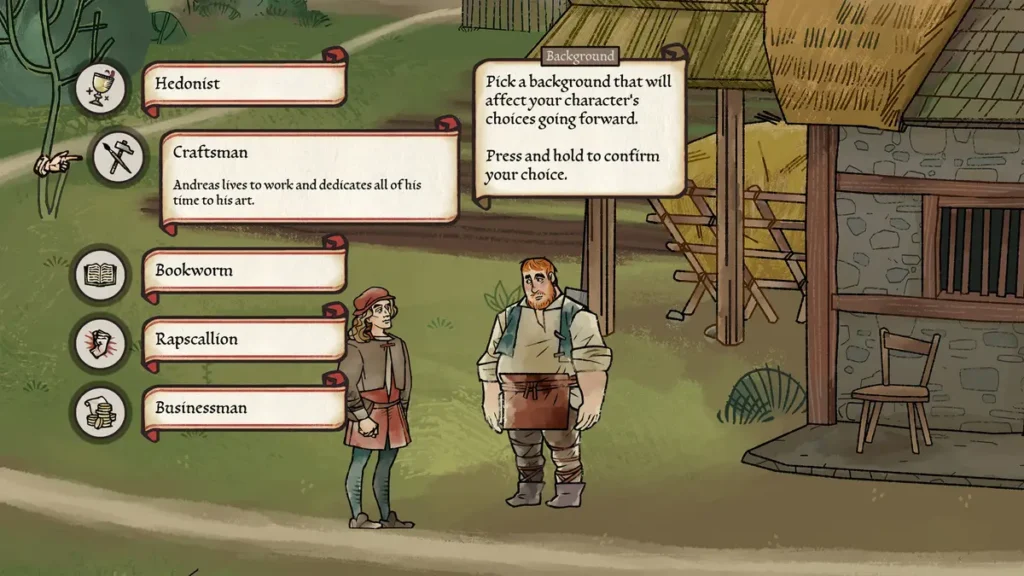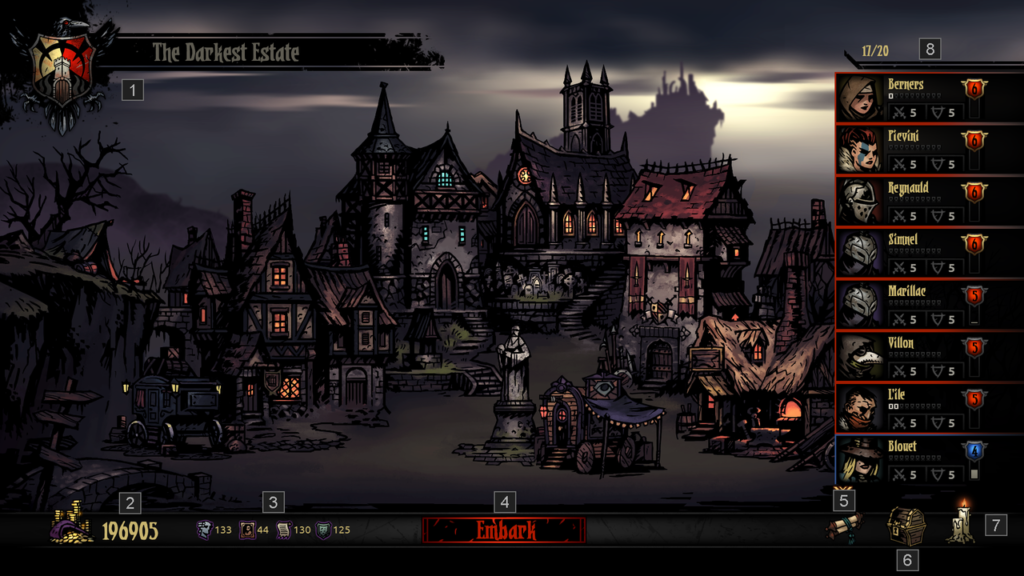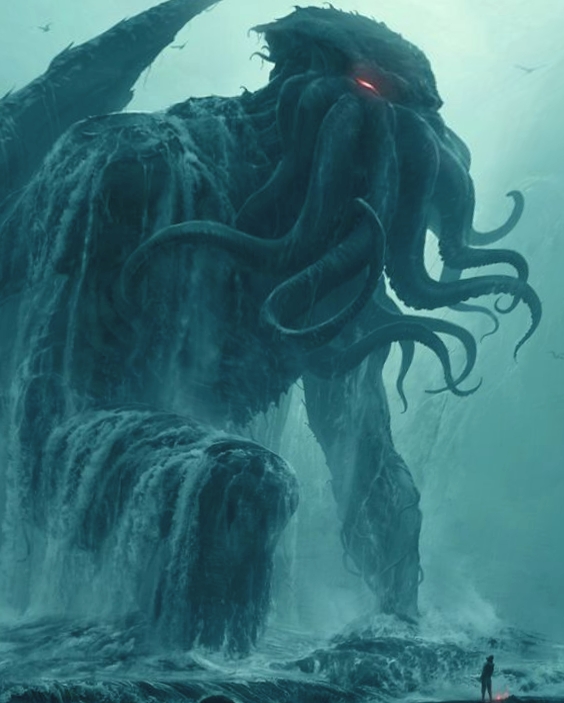Heya friendos! I finished playing the indie hit from last year ‘Dredge’, and in this week’s newsletter, I have some Thoughts™. We’ll touch on some experiences I’ve had with that as well as Pentiment, game design choices in those games as well as my thoughts on cosmic horror. Strap in, it’s going to be a long one!
How Am I Doing?
I’m quite good! When I came back from my little trip to Liège, I noticed I still needed some time to rest. It was rainy and grey all week, so I opted to do another playthrough of Pentiment. It’s an Obsidian Entertainment game, so naturally, there’s enough choice and consequence to do multiple playthroughs. To soothe my need to feel productive, I was incidentally able to mark this down as research for Rumorweaver as well!
Pentiment Second Playthrough
What struck me as interesting is that the general set-up and plot of the game does not change all that much, no matter what choices you make. The three-act structure remains the same: the hook and mystery stay unchanged. On paper, you don’t have all that much influence over the story. But my second playthrough still felt very different.
This was partially because you only have limited in-game time to experience specific content, so parts of the content are locked off in a single playthrough. In my second playthrough, I was able to experience that content but lock off the stuff I did in my first playthrough instead. Even if the progression of the story remained largely the same, the stuff I actually did in the game was completely different.

The other factor in making choices feel like they matter was the individual character’s storylines. Your relationship to characters and how they grow is influenced by your interactions with them. Even though it has no impact on the main plot, people interact differently with you based on your prior interactions with them! There’s definitely some wisdom to gauge there that feeds into my concept of systemic narrative for Rumorweaver.
What’s funny is that trying to explore those different possibilities gave my character an entirely different arc. In the first playthrough, I tried to roleplay as a drunk playboy but ended up with a pretty beautiful redemption arc because I couldn’t get myself to be an ass to all these people. In my second, I tried to be a pious zealot but ended up being an extremely mean good-for-nothing. Both of those arcs felt natural, just by playing the game. That’s pretty impressive!
What Am I Doing?
The other game I’ve played is Dredge, a cosmic horror fishing game that made some headlines when it came out last year. I’ve had this game personally recommended to me and my expectations were already quite high as I love the pitch. I will talk a little about my experience here, but I will try to avoid spoilers altogether, so don’t worry. If you want to go in completely blank (without reading the game’s description apparently), you can skip ahead to the YouTube header below.
I fell in love with the game in the first two hours. The loop is moreish, the core mechanics are smooth and unobtrusive and the general atmosphere of the game is fantastic. That being said, I can’t help to shake the feeling of unfulfilled potential. I think it’s because of two promises the game seems to make that didn’t hold up to my standard: the hub and cosmic horror.
The Hub
At the start of the game, you’re introduced to a quaint fishing town. This is your tutorial area, and several characters are introduced to help you on your way to learning the game. They set you up with some quests that will eventually lead you to the main quest. All of this is done exceptionally well.
However! It felt to me that the game telegraphed that this town was going to be your home base. Each character has something mysterious about them and asks increasingly taxing things from you. There are some small, multi-step quests that grow the town and progress the character’s story. Then, the game leads you out to explore the wide world… and you practically don’t have to return to this town ever again. There are some exceptions, but they’re few and far between.
The starting area is designed to be just that: a tutorial zone. Then, you’re expected to venture forth and do the quests for each biome. But somehow the telegraphing of the story made me think this was going to be your base of operations, like in Darkest Dungeon. I completely assumed I was going to build it up, help out the characters, and return victoriously every time I finish a quest. I thought the town and the people in it were going to be the focus of the plot. The game didn’t deliver on that promise enough for my taste.

Interestingly enough, one of the DLCs does execute that concept well. To the developer’s credit, the Steam page accurately describes that experience and does not describe anything like that on the main game’s page. So it’s just a promise I imagined myself, through how the game telegraphed the starting area.
Cosmic Horror
The other issue I take with the game is its description of cosmic or Lovecraftian horror in marketing materials. It’s already a shame that those two terms are so strongly intertwined because I believe this genre of horror is held back by the association with its originator. First, because he was a massive racist, of which some made its way into his works. But also because it seems like people have a hard time disconnecting the themes of cosmic horror from the shape that Lovecraft gave it.
You see, in a lot of writing, but in games especially, creators seem to focus on the form of cosmic horror over the substance. What I mean by that is people take inspiration from the “representational” elements that come with Lovecraft’s mythos: elder gods, interdimensional beings, cults, fish people, and madness.
What I particularly like about cosmic horror, and what has been elevated by other authors since Lovecraft is the quintessential theme: an existential feeling of insignificance. This can stem from the realization of humanity’s minuscule place in the universe, unfathomable knowledge that our brains can’t handle without breaking, and the sheer scale of things that make us seem like ants or treat us like cattle.

Those things are expressed through said representational elements, but I’ve found that a lot of writing fails to deliver on the actual theme. I’ve felt the same with Dredge. Naturally, it goes with the more nautical representations that come from Lovecraft‘s work. While they execute on that form quite well, I feel there is a lack of substance to make me feel insignificant enough to be horrifying. There are a few exceptions once again, with some notable moments that do deliver on that promise.
While it might seem I’m ragging on this game a lot, all in all, I still very much enjoyed Dredge. I’m extremely curious about what the developers come up with next. I hope my personal gripes with it are addressed in their next project!
YouTube
In other news: I was able to record and start the editing process for a new cornerstone YouTube video. As of today, the editing process is a lot less painful than the previous times. I hope that momentum keeps me going and I can get it done within a week. If not, you’ll probably hear me complain about editing again in next week’s newsletter.
Why Am I Doing? (this)
I usually try to find a different outlet for these kinds of design “takes”. Often, it just ends up as a discussion between my creative peers or a thread on social media. If they’re larger, I end up dedicating a whole blog post or video on them. This one seemed to straddle the line between a small take for a newsletter or big take for blog post, but here we are!
I’ve watched NoClip documentaries about both Pentiment and Dredge, so I guess I was also in the analytical spirit this week. Despite all my ramblings, Dredge is aspirational to me. It’s a tiny studio that dished out a fantastic and highly acclaimed debut game with very reasonable scope.
I often fear that my current ideation of Rumorweaver is too large in scope, but the success of Dredge makes me think I can get away with something a lot smaller than initially planned. We’ll see where it goes. Anyway, go play Dredge and Pentiment, they’re both fantastic games!
